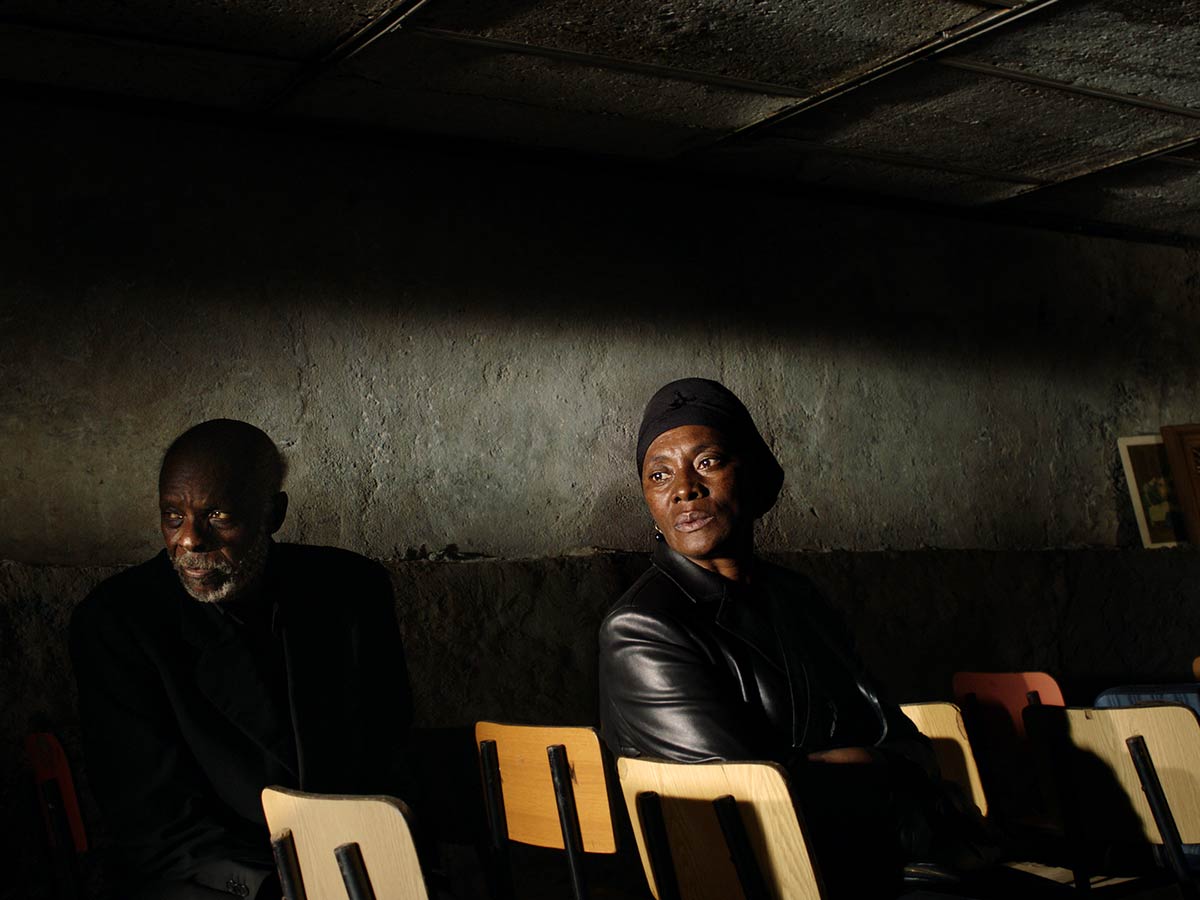Surrounded by all sides by corroded concrete, encased in stifling darkness, stone-faced men shuffle down an alleyway carved into the lifeless fabric of a Cape Verdean slum. Crucifixes, entrenched in the surface above them, loom over their heads. Death permeates the air. No further introduction is offered, and no further introduction is needed. And so begins Pedro Costa’s endlessly contemplative, transcendental drama “Vitalina Varela.”
Adopting its title from the leading actress’s actual name, Costa’s newest feature, watered down to a simplistic description, depicts a woman who immigrates to Portugal as she seeks to come to terms with the death of her recently departed husband, a plight that ropes in a priest (portrayed by Ventura, a recurring Costa collaborator) combating a spiritual crisis. Yet, beneath the surface looms a crushing reflection on consequence, grief and the search for God.
“Vitalina Varela” exists in a world of its own, a plane of reality merged somewhere between heaven and hell; Portugal might function as the film’s literal location, but the atmosphere—icy, isolated, incomparably empty—establishes a purgatory-esque landscape occupied by wandering souls devoid of spirit. Time does not exist in this world. Shadows cloak every corner of the screen for the greater part of the two-hour runtime, creating a lower-class wasteland where light is a valued resource, a luxury that viewers only glimpse on occasion.
This is intentional. The overall lack of luminescence not only adds to the film’s unforgettable visual language—each individual scene functions as a self-sustaining, symmetrical loop that could spiral on endlessly—which is guaranteed to imprint ghostly afterimages, but also accompanies the definitively spiritual underpinnings of “Vitalina Varela.”
In body, mind, and soul, spirituality courses beneath every component of Costa’s abstract drama. A discourse on death introduces itself rather early on, specifically the Christian perception of death functioning as the entrance to eternal life contrasted with the non-religious viewpoint of death as one’s permanent erasure from existence. Moreover, motifs such as a fire, which represents enduring passion and an unpredictable tool of destruction equally, as well as the aforementioned visual and emotional conflict between light and darkness drag the work’s biblical themes to the forefront of the picture.
Coinciding with Varela’s repeated reference to the number 45 in a scene about halfway through the film, the thesis of Costa’s film ostensibly derives itself from Isaiah 45, a passage intended to both encourage the Israelite people amidst trials and foreshadow the coming of Jesus Christ, an eternal symbol of hope, for ensuing centuries. Additionally, as evidenced in Isaiah 45:6-7, the text relates back to the director’s fixation on the dueling sentiment of doubt and steadfast belief—primarily evidenced by Ventura’s tortured priest character—by stating, “…I am the Lord, and there is no other. I form the light and create darkness, I bring prosperity and create disaster; I, the Lord, do all these things.”
Consequently, crucifixes spring up at every turn in the forms of golden statues, gravestones, and even nightmarish, cross-like telephone poles. By this measure, God is everywhere, but Costa ensures to highlight the inanimate nature of these appearances, which undercuts the traditional sanctity of these images by imparting a distinct feeling of abandonment further bolstered by an inescapable, near-apocalyptic landscape. Has God abandoned humanity? Is humankind foolish for turning to faith in times of hardship? Does death unite believers with their Creator, or do they simply fade into oblivion? “Vitalina Varela” leaves these questions for you to answer.
Corresponding with the ominous possibility of extinction, the futility of devoting one’s life to acquiring material wealth as a means of security adds onto the ever-increasing list of biblical themes. Ingeniously, the aforementioned concept embodies itself with inventive an home construction and locked door motifs, which Costa equates with the notion that one’s house functions as one’s kingdom, a dwelling that safeguards possessions that will outlive their owner; in a scene that highlights this theme, items like a table, chairs and a microwave are listed out by a character.
Aligning itself with the director’s prior works, Costa’s cinematic dissertation on the impermanence of life, love as a sacrificial commitment and the existence of God requires a refined attention span and a liberal tolerance for a slow-burning narrative flow, but viewers in search of a visually masterful and emotionally desolate arthouse feature could find “Vitalina Varela” to be one of the most thought-provoking international features to debut in quite some time. [A]





